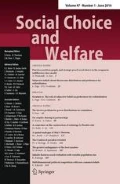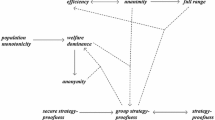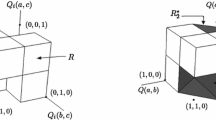Abstract
The unequivocal majority of a social choice rule is a number of agents such that whenever at least this many agents agree on the top alternative, then this alternative (and only this) is chosen. The smaller the unequivocal majority is, the closer it is to the standard (and accepted) majority concept. The question is how small can the unequivocal majority be and still permit the Nash-implementability of the social choice rule; i.e., its Maskin-monotonicity. We show that the smallest unequivocal majority compatible with Maskin-monotonicity is \({n-\left\lfloor \frac{n-1}{m} \right\rfloor}\) , where n ≥ 3 is the number of agents and m ≥ 3 is the number of alternatives. This value is equal to the minimal number required for a majority to ensure the non-existence of cycles in pairwise comparisons. Our result has a twofold implication: (1) there is no Condorcet consistent social choice rule satisfying Maskin-monotonicity and (2) a social choice rule satisfies k-Condorcet consistency and Maskin-monotonicity if and only if \({k\geq n-\left\lfloor \frac{n-1}{m}\right\rfloor}\).
Similar content being viewed by others
References
Baharad E, Nitzan S (2003) The Borda rule, Condorcet consistency and Condorcet stability. Econ Theory 22: 685–688
Erdem O, Sanver MR (2005) Minimal monotonic extensions of scoring rules. Soc Choice Welf 25: 31–42
Greenberg J (1979) Consistent majority rules over compact sets of alternatives. Econometrica 47: 627–636
Jackson MO (2001) A crash course in implementation theory. Soc Choice Welf 18: 655–708
Maskin E (1999) Nash equilibrium and welfare optimality. Rev Econ Stud 66: 23–38
Repullo R (1987) A simple proof of Maskin theorem on Nash implementation. Soc Choice Welf 4: 39–41
Sen A (1995) The implementation of social choice functions via social choice correspondences: A general formulation and a limit result. Soc Choice Welf 12: 277–292
Thomson W (1999) Monotonic extensions on economic domains. Rev Econ Des 4: 13–33
Weber JS (1993) An elementary proof of the conditions for a generalized Condorcet paradox. Public Choice 77: 415–419
Author information
Authors and Affiliations
Corresponding author
Rights and permissions
About this article
Cite this article
Amorós, P. Unequivocal majority and Maskin-monotonicity. Soc Choice Welf 33, 521–532 (2009). https://doi.org/10.1007/s00355-009-0377-5
Received:
Accepted:
Published:
Issue Date:
DOI: https://doi.org/10.1007/s00355-009-0377-5




